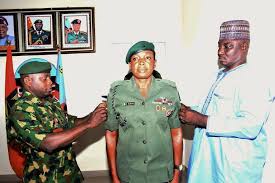A Watershed Moment for Equality
The air in Abuja’s Nigerian Army Women Command Conference Room crackled with history on January 3, 2025. As Brigadier General Mathias Amatso pinned the rank badge of Army Warrant Officer onto Hajara Egbunu’s uniform, decades of unspoken barriers disintegrated. In that moment, Egbunu became the first female soldier from Nigeria’s elite Infantry Corps—the combat backbone of the nation’s defense—to achieve this prestigious rank. This wasn’t merely a promotion; it was a seismic shift for military gender inclusion in Africa’s most populous nation. For young women across Nigeria, Egbunu’s shoulders now carry the weight of possibility—proof that even the most entrenched institutions can evolve when talent meets opportunity.
The Ceremony: Where Symbolism Met Substance
A Deliberate Display of Change
The setting spoke volumes: the Command Conference Room, typically reserved for strategic briefings, transformed into a theater of transformation. Brigadier General Amatso, Commander of the Nigerian Army Women Command, personally officiated the decoration—a visual endorsement from the highest levels. Lieutenant Maureen Ogbuka, Acting Assistant Director of Army Public Relations, documented every moment, ensuring this milestone resonated beyond the room. No fanfare, no grandiose spectacle—just military precision punctuated by the snap of cameras during the group photograph and the clink of glasses during refreshments. Yet in its modesty lay its power: the Army normalizing excellence irrespective of gender.
Words That Framed the Future
Brigadier General Amatso’s address cut to the heart of the moment: “Your promotion reflects exceptional professionalism, dedication, and effectiveness.” His charge to Egbunu was equally significant: “Continue setting an example by upholding discipline and inspiring younger soldiers.” This wasn’t generic praise—it was a public blueprint for how women’s leadership would integrate into the Army’s core values. The Nigerian Army’s official statement later amplified this, labeling the event a “historic milestone”—institutional language telegraphing a new era.
Warrant Officer Egbunu: Anatomy of a Trailblazer
The Climb Through the Ranks
Egbunu’s path wasn’t a sudden ascent; it was a 20-year masterclass in resilience. Before this breakthrough, she served as Regimental Sergeant Major of the Nigerian Army Women Command—a role demanding unparalleled operational discipline and leadership acuity. Her progression within the Infantry Corps, historically perceived as a male fortress, dismantles two myths simultaneously: that women lack the aptitude for combat specialties, and that they cannot thrive in the Army’s most physically demanding domains. Her career is a lived rebuttal to cultural resistance.
The Mentorship Ecosystem
In her emotional acceptance speech, Egbunu mapped her support network with precision: Divine grace as her anchor (“I stand here by God’s grace”), Lieutenant General OO Oluyede (Chief of Army Staff) for his “visionary leadership” in restructuring advancement pathways, and Brigadier General Amatso’s hands-on mentorship during her tenure as Regimental Sergeant Major. This trifecta is crucial—it reveals that individual brilliance alone doesn’t shatter glass ceilings. Institutional courage and invested mentors do. Her dedication of the honor “to every young woman striving to break barriers” wasn’t rhetoric; it was a baton pass.
Decoding the Rank: Why Warrant Officer Matters
The Bridge Between Worlds
The Army Warrant Officer isn’t just another rank—it’s the pinnacle of non-commissioned officer leadership. These are the Army’s “highly skilled, single-track specialists,” revered for their technical mastery and operational wisdom. They occupy a unique space: translating officers’ strategic directives into actionable reality for enlisted personnel while advocating for ground-level concerns upward. This role demands an almost alchemical blend of expertise, credibility, and emotional intelligence—making Egbunu’s achievement all the more consequential.
Egbunu’s Mandate and Influence
Her responsibilities now extend beyond ceremonial symbolism. As Warrant Officer, she must enforce discipline while mentoring junior soldiers across genders, serve as the Infantry Corps’ technical advisor in her specialty area, and model leadership that normalizes women’s authority in combat arms. Critically, her position grants her a voice in policy forums where gender inclusion barriers—like combat exclusion policies or recruitment quotas—are debated. She embodies the Army’s professed values where it matters most: on the inside.


